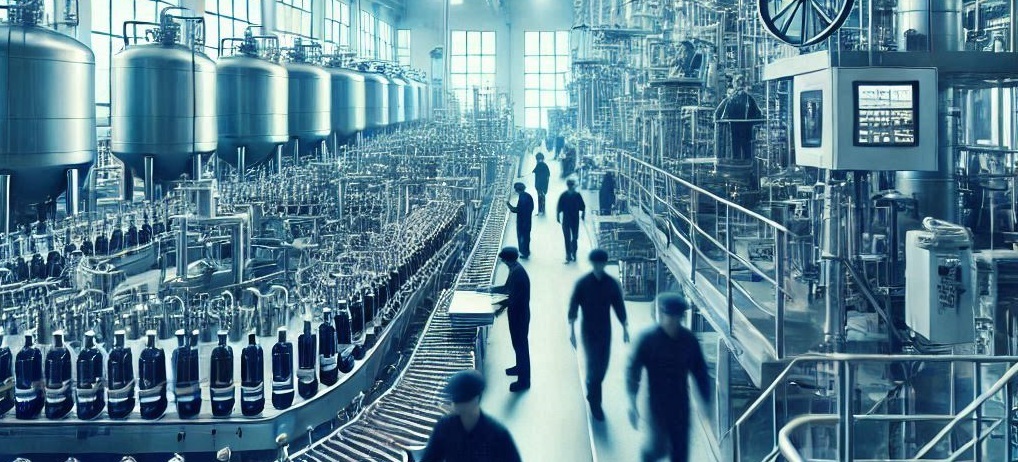The global beverage industry is experiencing remarkable growth.
According to a report by Mordor Intelligence, the sector is projected to reach $4.39 trillion by 2028, with an annual growth rate of 4.26%.
This surge is driven by several factors, including increased health awareness, leading to greater demand for functional and low-alcohol beverages, and the proliferation of innovative products that address the market's evolving needs. Moreover, today's consumers not only seek greater variety and personalisation in their beverages but also demand transparency in production processes and more efficient supply chains.
In this context of growth and change, companies face the challenge of continuously improving their processes, innovating to remain competitive, and meeting growing consumer expectations.
The driving force of change
Technology plays a crucial role in this transformation. Tools such as the Internet of Things (IoT), artificial intelligence (AI), and big data are optimising operational processes, reducing waste, and increasing efficiency.
AI, in particular, stands out for its ability to analyse vast amounts of data in real time. This enables companies to predict demand, adjust production processes, and reduce costs. Additionally, tools such as blockchain have revolutionised supply chains, enhancing traceability, predicting disruptions, and making operations more agile and transparent.
The adoption of Enterprise Resource Planning (ERP) platforms is also integrating key areas like finance, business operations, and human resources. This technology facilitates strategic decision-making based on up-to-date data and strengthens companies' ability to quickly adapt to market changes.
A focus on sustainability
Digital transformation is also reshaping how the beverage industry addresses its environmental commitments. Smart management systems enable companies to precisely measure water consumption, reducing waste by up to 30% through sensors that detect leaks in real time and optimise cleaning cycles. Advanced analytics platforms are reinventing logistics: predictive algorithms reduce unnecessary distribution routes, leading to measurable reductions in CO2 emissions.
In bottling plants, automation allows production to align with actual demand, minimising excess inventory and, consequently, waste of raw materials and energy. Digital twins—virtual replicas of production lines—enable manufacturers to simulate and optimise processes before implementation, reducing energy consumption by up to 25%.
Furthermore, blockchain is facilitating the complete traceability of returnable packaging, increasing recycling rates and allowing companies to transparently document their environmental impact.
These efforts not only meet the expectations of environmentally conscious consumers but also represent a more efficient and profitable business model.
Lessons from transformation
An example of successful digitalisation in the beverage industry is Jixifu Wine, a Chinese company specialising in importing French wines. The company implemented a globalised ERP system to meet the financial and commercial demands of its rapidly growing business.
Jixifu Wine partnered with Acloudear, a seasoned technology company and member of United VARs, SAP’s partner alliance.
Acloudear designed a SAP Cloud ERP solution for Jixifu, integrating finance, inventory management, sales, and human resources, achieving more efficient oversight and control of the company’s commercial and financial operations across its subsidiaries in China.
With SAP Cloud ERP, Jixifu gained new perspectives for its business and limitless possibilities for sustainable growth in the medium and long term.
A similar case confirming the benefits of digitalisation is that of Paulaner, a German beer manufacturer. Paulaner also implemented SAP Cloud ERP to streamline its processes and simplify operational procedures and workloads.
With Acloudear's support, Paulaner integrated all its business circuits—from foreign procurement to domestic sales and invoicing—through a flexible, user-friendly, and stable tool.
Challenges on the road to success
The path to modernisation is not without obstacles. Companies in the sector face the challenge of upgrading deeply rooted legacy systems while maintaining operations without compromising product quality.
Resistance to organisational change emerges as a critical barrier: staff accustomed to traditional manual processes often view automation and new technologies with scepticism. Adding to this is the need to find and retain tech-savvy talent, a scarce resource in an industry traditionally detached from the tech world.
The initial implementation cost and difficulty in calculating short-term returns on investment also hinder digitalisation efforts, especially for medium-sized and smaller businesses.
However, these challenges, far from being insurmountable barriers, represent opportunities to reimagine the industry's future. Companies that overcome these hurdles emerge stronger, more efficient, and better equipped for an increasingly competitive market.
The success of a beverage company in the digital era lies in its ability to foster an organisational culture that embraces innovation, encourages continuous learning, and keeps the customer at the heart of its transformation.
Businesses that achieve this harmonious integration of technology and corporate culture will set the new standards of excellence in the industry.

stronger than one
